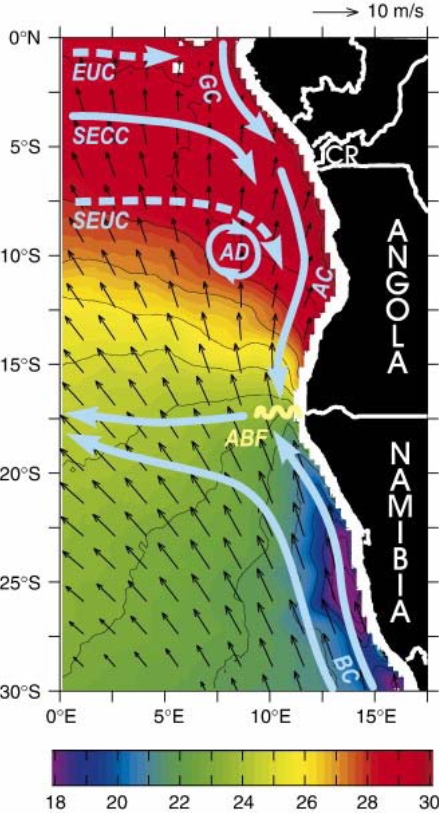Southwest African Coastal Upwelling
System and Benguela Niños (SACUS)
Coastal countries of southwest Africa strongly depend
upon their ocean: societal development, fisheries, and tourism face
important changes associated with climate variability and global change.
Global climate change will particularly impact eastern boundary upwelling
regions by a combination of different stressors: increasing temperatures,
acidification and deoxygenation. The main focus of the proposed study
is the coastal upwelling off southern Africa. We will study its variability
forced locally by the wind field and remotely by both wave propagation
and water mass advection from the equatorial region, its interaction
with the open ocean, and its response to climate change with its impact
on rainfall of the region. Our collaborative project will address physical
mechanisms of regional climate variability with profound impact on ocean
biogeochemistry, hypoxia and marine ecosystems. We will use dedicated
observing systems, experiments at sea as well as various modeling approaches
in order to study intraseasonal to long term changes of the southwest
African coastal upwelling system (SACUS) and the overlying atmosphere
to finally improve climate predictions for southern Africa. The project
aims at building and expanding local capacities required for the monitoring
and prediction of the variability of the upwelling system and of the
climate of surrounding land areas by cooperative research, joint summer/winter
schools and scientist/technician exchange, by teaching of PhD students
from southern African countries at German Universities, by research
cruises open for southern African participants and by providing data
and model output for analysis at southern African universities and institutes.
| Schematic oceanic circulation of the southwest African coastal upwelling region in late austral summer superimposed on mean sea surface temperature (SST, color scale) and wind speed and direction (black arrows). Major features are Equatorial Undercurrent (EUC), South Equatorial Counter Current (SECC), South Equatorial Undercurrent (SEUC), Gabon Current (GC), Congo River (CR), Angola Current (AC), Angola Dome (AD), Angola Benguela front (ABF) and Benguela Current (BC). SST is plotted every degree from 18 to 30 °C. Maximum wind speed is 8 m/s in the south and minimum wind speed is 3 m/s just north of the ABF (from Rouault et al., 2007).
|

